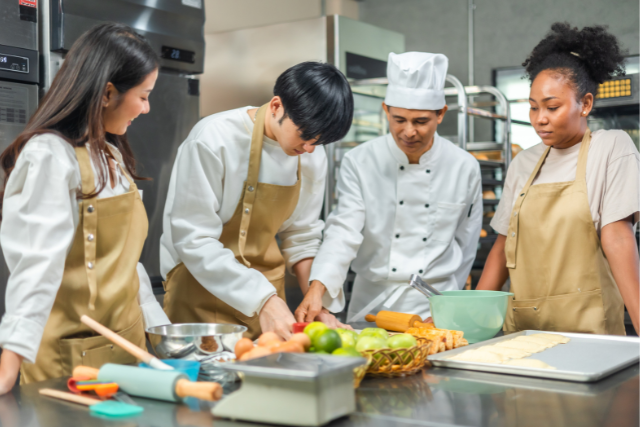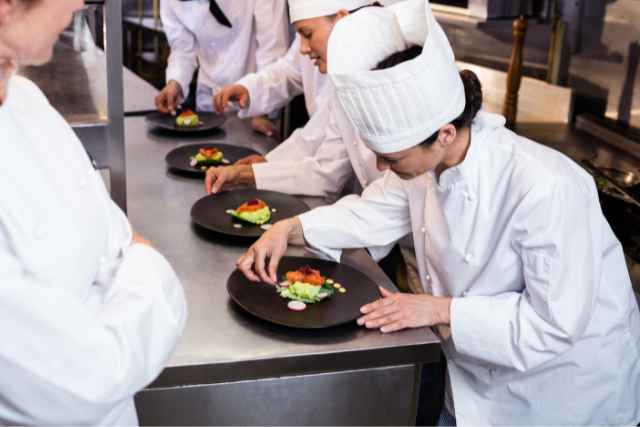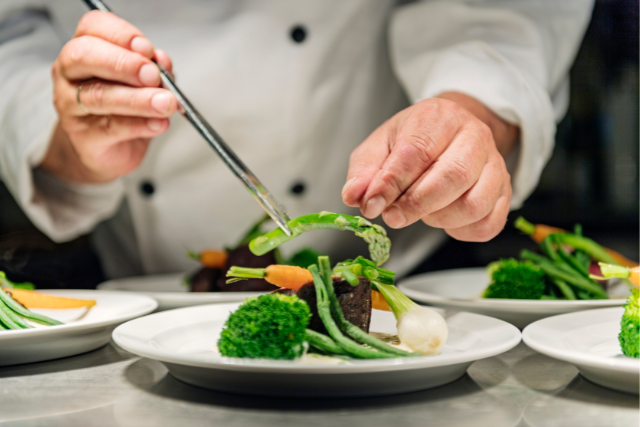
Today’s digital platforms make cooking lessons easy to access. YouTube and TikTok are filled with quick, visual tutorials from both home cooks and professional chefs. Recipes are simple to follow and designed for fast learning.
This shift has changed how many people approach cooking. But with so much culinary information available online, do formal cooking lessons still matter, particularly those offered by established institutions like CCA Manila?
This article explores how structured cooking class compares to digital content and why hands-on instruction is essential for aspiring chefs, food entrepreneurs, and dedicated home cooks.
The Benefits of a Structured Learning Environment
Step-by-Step Skill Progression

Without context, a structured program doesn’t jump from one technique to another but follows a clear learning path, where each lesson builds on the last. This steady progression helps create a solid foundation and supports long-term skill development.
Rather than trying to absorb everything simultaneously, the focus stays on one area at a time. As the course progresses, each new technique ties into what’s already been practiced, making the process easier to understand and apply in a real kitchen setting.
Real-Time Feedback and Correction
Formal training offers the benefit of immediate feedback. Instructors observe your technique and step in when adjustments are needed. Over time, this helps you recognize where things go off track and how to correct them with more control.
Small errors can affect timing, consistency, or overall quality in a fast-moving kitchen. Getting guidance as you work allows steady improvement and builds the expected accuracy.
Consistency Through Practice
Repetition plays a huge role in building technical skills, and the kitchen is no exception. When you train in courses in cooking at CCA Manila, you return to essential tasks until they become second nature.
A controlled environment allows you to refine one skill at a time. As you progress, your movements become more deliberate and your timing more reliable. Professional kitchens rely on that level of consistency because both speed and quality must always be maintained.
Mentorship From Industry Professionals
Training under chefs with real industry experience gives you access to insights beyond online tutorials. Instructors bring their background into every session, sharing practical knowledge, real kitchen dynamics, and lessons learned on the job. The experiences help you understand what employers expect and what it takes to succeed in a fast-paced environment.
Meanwhile, the mentorship gives you a clearer view of the industry’s challenges and possibilities, so you’re learning how to cook and building a career.
Hands-On Use of Professional Tools
Professional kitchens depend on specialized tools that require both skill and precision. Structured training programs provide hands-on experience with commercial-grade equipment, focusing on safe handling, efficient operation, and proper technique. They also cover setup and basic maintenance, essential for keeping the kitchen running smoothly and avoiding unnecessary delays.
Career Readiness and Industry Adaptability
Formal culinary training builds the discipline and confidence that professional kitchens demand. Students learn to navigate kitchen hierarchies, stay composed under pressure, and take full responsibility for their role on the line.
Formal instruction also develops a mindset of consistency, accountability, and collaboration. These qualities create opportunities across restaurants, hotels, catering services, and other areas of the food industry.
CCA Manila Program Highlights

Online videos are a great starting point for exploring new techniques or finding inspiration. But when it’s time to develop lasting skills and professional discipline, a structured program offers the depth and preparation that digital content can’t provide.
Here are some of the culinary courses offered at CCA Manila for those who want to build a strong culinary foundation:
Diploma in Culinary Arts & Technology Management
This full-time program is built for those planning a long-term career in the culinary industry. It offers in-depth training in traditional and contemporary culinary techniques while introducing essential business skills for managing a professional kitchen.
Students follow a structured path that covers kitchen operations, cost control, menu planning, and leadership fundamentals. Graduates are equipped to work on the line and grow into roles with greater responsibility, including chef de partie, executive chef, or culinary business owner.
Professional Chef Program Plus (6 Months, Part-Time)
Professional Chef Plus is ideal for those making a career shift or balancing other responsibilities while pursuing culinary training. The part-time format makes it accessible without sacrificing depth.
Through focused, hands-on sessions, participants develop a working knowledge of core techniques and kitchen operations. The curriculum is grounded in real kitchen workflows, offering practical preparation for those entering professional environments or seeking a structured skill upgrade.
Fundamentals in Culinary Arts
Geared toward beginners, hobbyists, and aspiring food business owners, this course focuses on essential kitchen practices. It introduces foundational techniques that form the base of most culinary work, from preparation methods to kitchen safety and organization.
The program is especially useful for those looking to explore a future in food or build a stronger foundation for personal projects or small-scale ventures. It balances practical application and skill development without overwhelming new learners.
Take the Next Step with CCA Manila
Online cooking content has made it easier to try new recipes, learn techniques, and explore what’s possible in the kitchen. It’s a useful starting point, but culinary arts schools offer something more—discipline, feedback, and a clear understanding of how professional kitchens operate.
We at CCA Manila offer programs for those ready to develop real culinary skills. Each course is built to reflect industry standards and prepare participants for the demands of a working kitchen.
Explore the options and enroll now!
